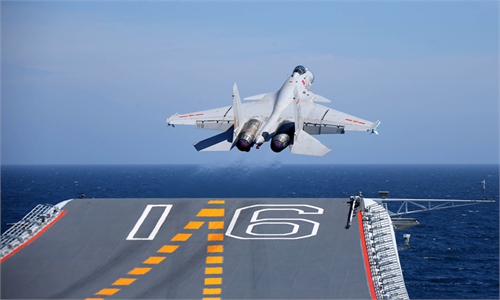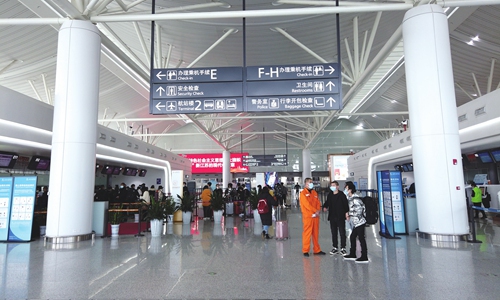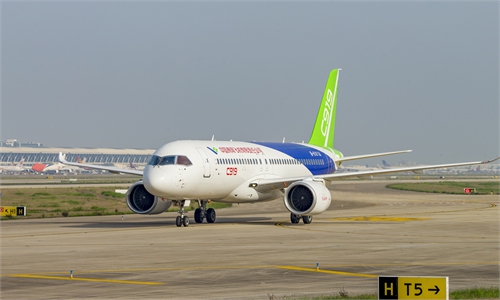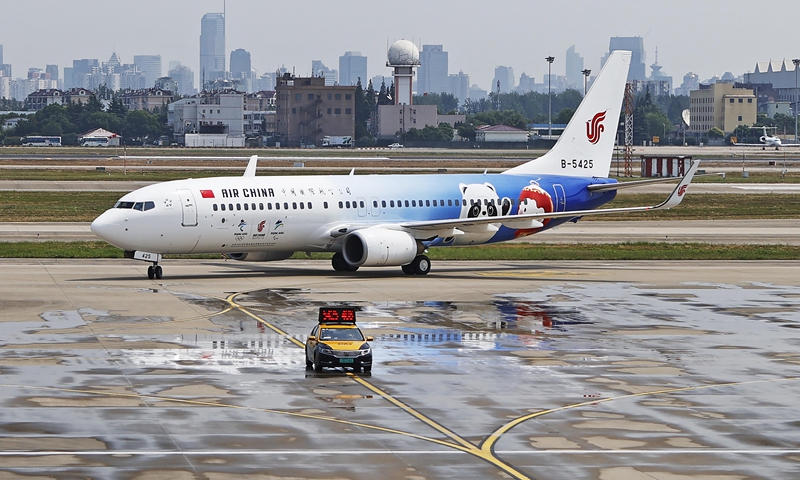
An Air China plane taxis at Shanghai Hongqiao International Airport in September 2020. Photo: cnsphoto
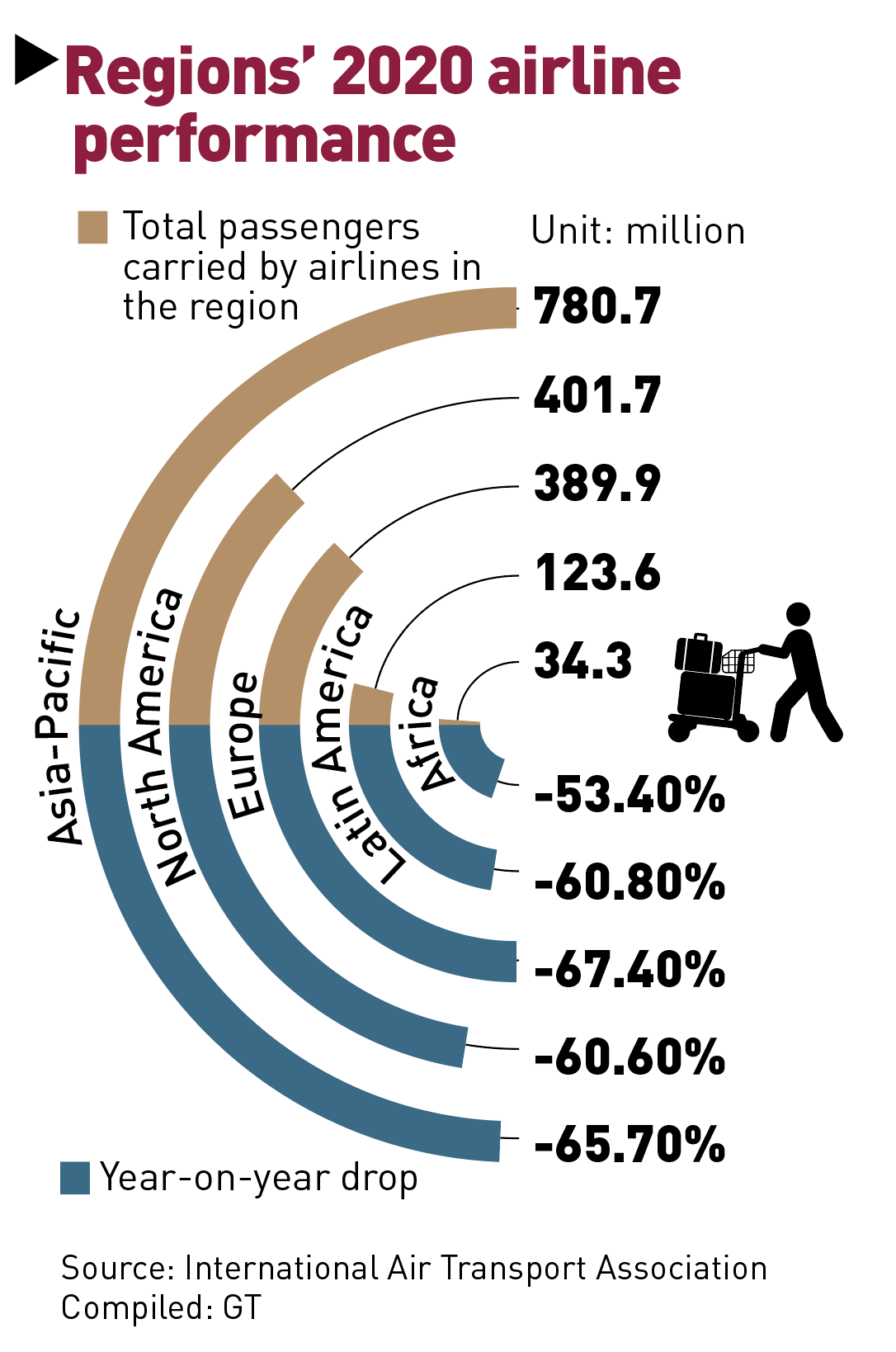
Graphic: GT
The domestic epidemic once again hit Chinese airlines.
It is the fourth peak season which the industry missed in the past years, which has already taken a significant toll on the civil aviation industry.
The Civil Aviation Administration of China (CAAC) announced on Tuesday that individuals who purchased tickets can apply for a full refund from Tuesday until August 31 after a new wave of Delta variant COVID-19 broke out across China.
More than 30 airlines, including Air China, China Eastern Airlines, China Southern Airlines and Hainan Airlines, canceled their flights on Wednesday in accordance with virus prevention and control orders issued by many cities.
According to Flight Master data, as of Wednesday, airports in major cities had canceled between 27 percent and 82 percent of scheduled flights.
"The soaring risk of the epidemic across the country, coupled with the ticket-refund policy of CAAC, has brought the summer travel season to an early end." Lin Zhijie, a market watcher told the Global Times on Thursday.
Before the outbreak of COVID-19, the demand for commercial flights typically peaked between July and August.
During the summer of 2019, China's entire industry operated more than 17,000 flights on any given day. In contrast, during the same period in 2020, the number of flights nationwide dropped by more than 14 percent.
Major airlines were generally optimistic for the 2021 summer travel season as of early July. The total number of flights planned for this period reached 960,000, 2.88 percent higher than the same period in 2019 before the epidemic.
However, a recent flare-up of new cases has thrown a spanner in the works for the country's commercial carriers. Market watchers said that the main passengers of the summer travel season are students. Due to the latest outbreak, most students are cancelling their travel plans and stay at home, costing airlines a majority of passengers.
Moreover, tourist attractions are the most popular destinations during the summer travel season, so the shut-down of major scenic spots has significantly reduced vacation possibilities.
Since the latest COVID-19 outbreak in Nanjing, Zhangjiajie and Zhengzhou, many cities in China have closed scenic spots with group gatherings prohibited.
"The benefits of the first half of the summer season have largely recovered. However, the second half ended early, which means the airlines will definitely fall back into loss making territory." Lin said.
"The severity of the epidemic had eased this year, but the sudden spread has added too much uncertainty to the civil aviation industry." Lin said, adding that he is not optimistic about a full-year turnaround.
Air China said in its 2020 annual report that it handled nearly 10 million ticket refunds and changes throughout last year, with revenue of 69.5 billion yuan ($10.2 billion) in 2020, down 48.96 percent year-on-year. It has experienced its highest loss of 14.41 billion yuan since going public.
China Southern, China Eastern and Hainan Airlines have also reported losses of 10.84 billion, 11.84 billion and 64 billion yuan respectively last year.
In the first quarter of 2021, these four major airlines continued their losses, with Air China losing $6.2 billion, China Southern losing $4 billion and Hainan losing $2.6 billion. A sluggish spring travel season has been attributed as the most common reason for the losses.
How to survive?
In the face of the pandemic, the aviation industry is now exploring new ways to keep revenue coming in.
An anonymous airline pilot told the Global Times that so far, their income has not been significantly impacted, but flight crews face more uncertainties, such as if one pilot just flying from or living in one high- or middle-risk area, and the entire crew could not fly for some days.
China's aviation regulator now requires crew members to take more nucleic acid tests, which also limits their ability to fly, the person said.
Regulators have vowed to take much stricter prevention measures on the ground by detailing management measures on the frontline staff, conducting more frequent nucleic acid testing among all-level aviation services staff, for example, front-line staff dealing with imported goods and aircraft-related services are required to undergo nucleic acid tests every other day; adjusting arrival quarantine and health-monitoring policies and enhancing staff protection in line with different work.
Airlines have always been searching way out such as launching fly free packages, and reallocating more capacity to cargo and freight.
Hainan Airlines jointly held their first product live sales event in partnership with travel platform qunar.com, attracting 430,000 viewers to watch online with 5 million yuan of sales within two hours of live broadcast on July 15.
Hainan Airlines has launched a number of popular summer routes, such as Beijing-Chongqing, Guangzhou-Beijing and Beijing-Sanya to make up for losses brought about by the epidemic. These routes have been well received by passengers, with many flights selling out.
Market insiders also think the cargo could be another way out, given passenger flights are being restricted.
On June 9, China Eastern Air Logistics Co was listed on the main board of Shanghai Stock Exchange, becoming the first independent listed company in China's aviation logistics industry.
In addition, the enthusiasm shown by domestic local airports for more freight routes is high. In early July, the cargo terminal 3 of Changsha Huanghua International Airport was officially put into use; at the end of May, Ningbo airport opened the first "Ningbo-Budapest, Hungary" cargo route to better connect cities in Europe.
However, market watchers are taking a cautious attitude toward the operation after some staff at the cargo transport having tested positive COVID-19 cases.
